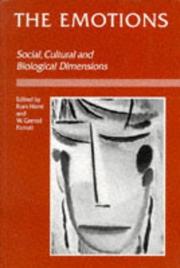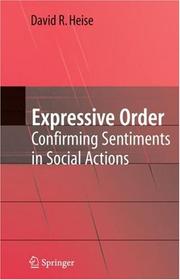| Listing 1 - 10 of 44 | << page >> |
Sort by
|
Book
ISBN: 1317083504 1317083490 1283572559 9786613885005 1409442551 9781409442554 9781283572552 9781409442547 1409442543 9781315599618 9781317083481 9781317083498 9781138250352 1315599619 Year: 2012 Publisher: Burlington, Vt. : Ashgate Pub.,
Abstract | Keywords | Export | Availability | Bookmark
 Loading...
Loading...Choose an application
- Reference Manager
- EndNote
- RefWorks (Direct export to RefWorks)
Analysing emotions and emotion-management in the academic organization, Passion and Paranoia shows how focusing on emotions in organizations can offer insights into important aspects and the dynamics of organizational processes. Drawing on rich interview material, this book demonstrates the often-overlooked importance of emotions in academic life, to reveal the manner in which emotion contributes to social bonds, power-relationships and hierarchies, micro-politics and processes of inclusion and exclusion from an academic career.
Emotions --- Sociology of emotions --- Sociology --- Sociological aspects.
Book
ISBN: 0367328666 0429907818 042948304X 1782412557 9781782412557 1782200088 9781782200086 1336183128 9781336183124 9781781813874 1781813876 9781782200086 0429922043 Year: 2018 Publisher: London : Routledge,
Abstract | Keywords | Export | Availability | Bookmark
 Loading...
Loading...Choose an application
- Reference Manager
- EndNote
- RefWorks (Direct export to RefWorks)
"Self-disgust (viewing the self as an object of abhorrence) is somewhat of a novel subject for psychological research and theory, yet its significance is increasingly being recognised in the clinical domain. This edited collection of articles represents the first scholarly attempt to engage comprehensively with the concept of self-directed disgust as a potentially discrete and important psychological phenomenon. The present work is unique in addressing the idea of self-disgust in depth, using novel empirical research, academic review, social commentary, and informed theorising. It includes chapters from pioneers in the field of psychology, and other selected authorities who can see the potential of using self-disgust to inform their own areas of expertise. The volume features contributions from a distinguished array of scholars and practising clinicians, including international leaders in areas such as cognition and emotion, psychological therapy, mental health research, and health and clinical psychology. This collection of papers offers a stimulating and timely investigation of that which the authors refer to as "the revolting self"; it is an invaluable handbook for all those academics and clinicians who want to understand and explore the concept of self-disgust further."--Provided by publisher.
Emotions --- Eating disorders --- Sociology of emotions --- Sociology --- Sociological aspects. --- Treatment.
Book
ISBN: 9780203834251 0203834259 9781136165009 1136165002 9780415892070 0415892074 9781136165016 1136165010 9781136164965 1136164960 9781138143784 1138143782 1280874376 9781280874376 9786613715685 6613715689 Year: 2011 Publisher: New York, N.Y. : Routledge,
Abstract | Keywords | Export | Availability | Bookmark
 Loading...
Loading...Choose an application
- Reference Manager
- EndNote
- RefWorks (Direct export to RefWorks)
Like any other valued resource, emotions are distributed unequally. Moreover, emotions are a generalized resource because they give people the confidence, or lack of confidence, to secure additional types of resources. Thus, this distribution of emotions roughly corresponds to the shares of others kinds of resources that members of various social classes possess. The level of positive and negative emotional energy evident among members of different social classes has large consequences for the viability of human societies. When a large majority of members in diverse social classes have rese
Emotions --- Sociology of emotions --- Sociology --- Sociological aspects. --- Social aspects.
Book
ISBN: 1945234296 9781945234293 9781945234019 1945234016 Year: 2016 Publisher: Raleigh, NC : Baltimore, Md. : Editorial A Contracorriente, Project MUSE,
Abstract | Keywords | Export | Availability | Bookmark
 Loading...
Loading...Choose an application
- Reference Manager
- EndNote
- RefWorks (Direct export to RefWorks)
Emotions --- Sociology of emotions --- Sociology --- Sociological aspects. --- Marx, Karl, --- Criticism and interpretation.

ISBN: 9780415427821 9780415427814 0415427827 0415427819 9780203961278 0203961277 9781134089598 9781134089635 9781134089642 1134089643 1280918004 1425903967 9786610918003 Year: 2007 Publisher: London Routledge
Abstract | Keywords | Export | Availability | Bookmark
 Loading...
Loading...Choose an application
- Reference Manager
- EndNote
- RefWorks (Direct export to RefWorks)
Sociological theories --- Affective and dynamic functions --- Social psychology --- Emotions --- Sociological aspects. --- Social aspects. --- Aspect sociologique --- Aspect social --- Sociology of emotions --- Sociology --- Social aspects --- Sociological aspects
Book
ISBN: 3110365480 3110391325 3110369516 9783110365481 9783110391329 9783110369519 Year: 2015 Publisher: Berlin ; New York : De Gruyter,
Abstract | Keywords | Export | Availability | Bookmark
 Loading...
Loading...Choose an application
- Reference Manager
- EndNote
- RefWorks (Direct export to RefWorks)
Raymond Williams coined the notion "structure of feeling" in the 1970's to facilitate a historical understanding of "affective elements of consciousness and relationships." Since then, the need to understand emotions, moods and atmospheres as historical and social phenomena has only become more acute in an era of social networking, ubiquitous media and a public sphere permeated by commodities and advertisement culture. Concomitantly, affect studies have become one of the most thriving branches of contemporary humanities and social sciences. This volume explores the significance of the study of affectivity for already thriving fields of cultural analysis such as media studies, memory studies, gender studies and cultural studies at large. The volume is divided into four sections. The first part, Producing Affect, brings together contributions which explore some of the ways in which new media works to produce and intensify affectivity. The essays making up the second part, Affective Pasts, explore the significance of affect to the ways we remember, commemorate and in other ways get hold of things in our recent and not so recent past - or fail to do so. The essays engage the affective production of presence in contexts such as 9/11, the emotional culture of the eighteenth century, and literary auto-fiction. The third part, Affective Thinking, examines various concepts, theories, and forms of thinking not so much to show how the thinking in question may inform the field of affect studies but rather in order to draw attention to the way in which these modes of thinking are themselves already attuned to matters of affect. New social relations and ways of being in a networked world are the common themes of the essays in the final part of the volume, Circulating Affect.
Culture --- Affect (Psychology) --- Emotions --- Study and teaching. --- Sociological aspects. --- Sociology of emotions --- Cultural studies --- Sociology --- Psychology --- Affect. --- Cultural Studies. --- aesthetics. --- media. --- Study and teaching --- Sociological aspects
Book
ISBN: 0815354320 1351133306 1351133314 1351133292 9781351133302 9781351133296 9781351133319 9781351133289 1351133284 9780815354321 036766173X Year: 2019 Publisher: Taylor & Francis
Abstract | Keywords | Export | Availability | Bookmark
 Loading...
Loading...Choose an application
- Reference Manager
- EndNote
- RefWorks (Direct export to RefWorks)
This international collection discusses how the individualised, reflexive, late modern era has changed the way we experience and act on our emotions. Divided into four sections that include studies ranging across multiple continents and centuries, Emotions in Late Modernity does the following: Demonstrates an increased awareness and experience of emotional complexity in late modernity by challenging the legal emotional/rational divide; positive/negative concepts of emotional valence; sociological/ philosophical/psychological divisions around emotion, morality and gender; and traditional understandings of love and loneliness. Reveals tension between collectivised and individualised-privatised emotions in investigating 'emotional sharing' and individualised responsibility for anger crimes in courtrooms; and the generation of emotional energy and achievement emotions in classrooms. Debates the increasing mediation of emotions by contrasting their historical mediation (through texts and bodies) with contemporary digital mediation of emotions in classroom teaching, collective mobilisations (e.g. riots) and film and documentary representations. Demonstrates reflexive micro and macro management of emotions, with examinations of the 'politics of fear' around asylum seeking and religious subjects, and collective commitment to climate change mitigation. The first collection to investigate the changing nature of emotional experience in contemporary times, Emotions in Late Modernity will appeal to students and researchers interested in fields such as sociology of emotions, cultural studies, political science and psychology.
Emotions --- Social aspects. --- Sociological aspects. --- History. --- Feelings --- Human emotions --- Passions --- Psychology --- Affect (Psychology) --- Affective neuroscience --- Apathy --- Pathognomy --- Sociology of emotions --- Sociology --- Society and culture: general

ISBN: 0803979290 1446221954 1283880733 1446265803 9781446265802 9781446221952 9780803979291 0803979304 9780803979307 9781283880732 9780803979304 Year: 1996 Publisher: London ; Thousand Oaks, CA : Sage Publications,
Abstract | Keywords | Export | Availability | Bookmark
 Loading...
Loading...Choose an application
- Reference Manager
- EndNote
- RefWorks (Direct export to RefWorks)
This is a broad, interdisciplinary look at the psychology of emotions, tracing historical, social, cultural and biological themes and analysis.
Emotions. --- Emotions --- Sociology of emotions --- Sociology --- Feelings --- Human emotions --- Passions --- Psychology --- Affect (Psychology) --- Affective neuroscience --- Apathy --- Pathognomy --- Sociological aspects. --- ro: ed. by
Book
ISBN: 9781529218251 9781529218237 Year: 2023 Publisher: Bristol Bristol University Press
Abstract | Keywords | Export | Availability | Bookmark
 Loading...
Loading...Choose an application
- Reference Manager
- EndNote
- RefWorks (Direct export to RefWorks)
Drawing on empirical research and mediated stories of migration and asylum seeking from the Global North, this book unpacks how emotions and affect are key conceptual lenses for understanding contemporary processes and discourses around migration.
Immigrants --- Affect (Psychology) --- Emotions --- Emigration and immigration --- Psychology. --- Sociological aspects. --- Social aspects. --- Emigrants --- Foreign-born population --- Foreign population --- Foreigners --- Migrants --- Persons --- Sociology of emotions --- Sociology --- Psychology

ISBN: 1280817089 9786610817085 0387381791 0387381775 1441942564 Year: 2007 Publisher: New York : Springer,
Abstract | Keywords | Export | Availability | Bookmark
 Loading...
Loading...Choose an application
- Reference Manager
- EndNote
- RefWorks (Direct export to RefWorks)
Expressive Order introduces affect control theory to lay readers of sociology, and additionally guides sociology specialists into the theory's deep structure. Briefly, affect control theory proposes that individuals shape their social interactions so that emerging impressions reinforce sentiments about salient identities, behaviors, and settings. Emotions signal how the process of confirming sentiments is going for each individual. The theory explains behaviors, emotions, social labeling, and personality attributions in a wide variety of social contexts—including intimate relations, work-world interactions, courtrooms, and international relations. Part 1 of the book provides a plain-language exposition of the theory, along with numerous interpretive analyses of everyday situations. This is engaging and provocative reading for anyone interested in social relations, including undergraduates in and out of the social sciences. Part 2 presents the mathematical derivations that define sentiment-confirming behavior, labeling, attribution, and emotion. The mathematical solutions, conjoined with understandings about social institutions, are the basis of the theory's explanations. The derivations clarify the theory's assumptions and reasoning, as only mathematics can. Part 3 of Expressive Order describes the research program associated with the theory and the computer simulation software that is used in research. This part of the book offers a jump start for individuals wishing to use affect control theory in their own research.
Social interaction. --- Social role. --- Affect (Psychology) --- Emotions --- Sociological aspects. --- Sociology of emotions --- Sociology --- Psychology --- Role, Social --- Social psychology --- Social status --- Human interaction --- Interaction, Social --- Symbolic interaction --- Exchange theory (Sociology) --- Sociology, general. --- Sociological Theory. --- Sociology. --- Social theory --- Social sciences
| Listing 1 - 10 of 44 | << page >> |
Sort by
|

 Search
Search Feedback
Feedback About UniCat
About UniCat  Help
Help News
News